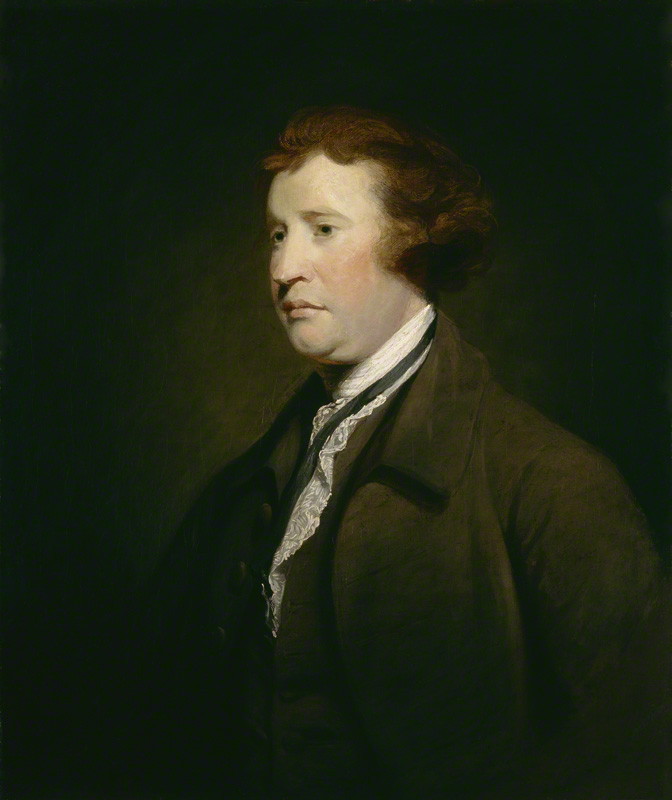
studio of Sir Joshua Reynolds, oil on canvas, (1767-1769)
Who was Edmund Burke?
An Irishman who as a member of Parliament argued eloquently in favor of the grievances of the American Colonies against the British Crown. He made his case based on the fact that the Americans were fighting for their rights as Englishmen against the Crown which had violated custom and tradition for the sake of taxation. Burke was also part of the effort to reconcile Great Britain with the United States after the War of Independence had ended.
A skilled Orator who impeached the Governor-General of Bengal, Warren Hastings, for unscrupulous, arbitrary, and tyrannical conduct against the Indian people. While Burke acknowledged the necessities of commerce by the East Indian Company, he pointed out that Hastings and others had essentially extorted or plundered their way to vast wealth – conduct that put them beyond the pale of what was deemed moral.
A lawyer who favored a policy of tolerance to Roman Catholics in English political life. He sought to enfranchise the Irish people, allowing Catholics to stand for election in Parliament.
And finally an excellent political essayist, who foresaw the bloodshed that would be caused by the French Revolution. At first he was accused of being an alarmist, as those sympathetic to the wave of revolution in America and France thought this would lead to a new era of reason and rational government. However, with the death of the Bourbon monarch Louis XVI and the beginning of the Terror, Burke’s views would come to be vindicated.
As a proponent of moderate political reform and champion of the underdog, most today may find it confusing that Edmund Burke also has the distinction of being the Originator of Modern Conservatism.
—————————————————————————
At first glance, it is a difficult thing for a reader to evaluate the political thought of Edmund Burke. He was no academic, but rather a man in the midst of the action – writing speeches, pamphlets, and essays as an active member of the political class. He wasn’t theorist, he was a do-er.
Burke also had a powerful allergy against philosophical abstraction. This forms the basis of his critique around the ideas that motivated the French Revolution. His key work remains the Reflections on the Revolution in France (1790), here he takes aim against a certain conception of natural rights.
For Burke, an appeal to natural rights would lead to “the commonwealth itself in a few generations, crumble away…into the dust and powder of individuality.” This may sound incredibly strange to modern ears, but it depends on how a person understands “natural rights.”
- John Locke: Natural Rights derive from the State of Nature. They are preserved by and form the basis of the powers of the government. In fact, government can be called to account for infringement upon these rights.
- Thomas Hobbes: Natural Rights are whatever promotes survival. They must be surrendered to the State which rescues people from a life that is “nasty, brutish, and short.” Therefore, appealing to natural rights is destructive of State power and returns us back to that Dog-Eat-Dog existence.
Burke is reacting to the Hobbesian definition. In his view, the viability of government rests on customs, conventions and traditions which form the habits and expectations of the populace. These “prejudices” (or rather pre-judgments) form the real basis for the rights of man and are particular to the countries of origin.
Often these conventions are not capable of rational demonstration. They may even rest on historical fictions. But that doesn’t really matter to Burke, because as long as they are believed they work to hold society together.
Here we see that pragmatic sense of the art of politics, rather than an abstract understanding of how the state should operate. It is for this reason that Burke has a sincere attachment to the British Constitution and other bodies of traditional law in other countries.
Ultimately, all law is a kind of historical achievement whose authority depends on their age rather than on abstract rights. This is the reason why when new unpopular laws are passed, they are often difficult to enforce even if they can be articulated in terms of natural rights. People only begin to respect laws that have been in effect for a very long time as they become “the norm.” And in some cases the law isn’t respected at all if it clashes too much with the character of the population.
Prudential management and practical statesmanship must triumph over abstract plans, or else the result will end not in the rule of reason, but the rule of brute force. The outcomes of the French Revolution validated this viewpoint as factions with different interests justified actions based on their understanding “natural rights” and the extant of government power should be. And when an impasse was reached – one group was purged at the expense of another.